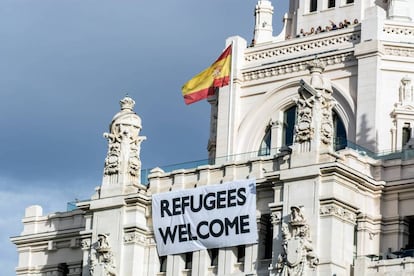Madrid’s banner of shame
City Hall says it “welcomes refugees” while letting dozens of Syrians camp out by the M-30 beltway

Madrid’s Plaza de Cibeles is one of the Spanish capital’s most emblematic spots, something of a showcase, where the most important events in the capital, and sometimes in all of Spain, often take place. It is dominated by the Phrygian fertility goddess Cybele, who gives the huge roundabout its name, along with the neo-plateresque Palace of Telecommunications, built in 1919, and which is now the site of City Hall, run by Mayor Manuela Carmena of the left-leaning Ahora Madrid. Cybele’s chariot faces south, so she is unable to see the huge banner reading “Refugees Welcome” that the mayor has hung from the building, which is just as well, as she would probably take flight out of shame.
When nearly 100 Syrian refugees end up camping in a park by the M-30 beltway and City Hall still has the welcome sign up, citizens end up confused as to what “Refugees Welcome” really means. In May, Carmena said: “We are allowing an infinite number of people to die and we are prepared to take them in.”
The humanitarian crisis of these refugees is the responsibility of all levels of government and society as a whole José Luis Blanco, mayor of Azuqueca de Henares
That may be the case, but so far City Hall hasn’t. It should be said that the final responsibility for these families, who have traveled more than 5,000 kilometers to escape the horrors of war, does not fall to this or any other city authority, but instead to the central government’s Labor and Social Security Ministry. Just hours after the existence of the refugees’ camp was brought to its attention by protest party Ciudadanos, the ministry transferred the majority of these terrified victims to the small town of Azuqueca de Henares, some 70 kilometers northeast of the capital.
Its mayor, José Luis Blanco, of the Socialist Party (PSOE), who hasn’t placed any banners on the façade of Azuqueca de Henares’ town hall, said: “The humanitarian crisis these refugees are living through is a problem that is the responsibility of all levels of government and society as a whole. That is why, from Azuqueca, we are prepared to cooperate with the ministry, despite it being the government’s responsibility.”
With the disappearance of the refugees from Madrid, the problem has disappeared too: everybody is happy. The families will be scattered throughout Europe, but before then, through the windows of the buses that took them to Azuqueca, they will have seen the huge banner welcoming them to a city that was prepared only to offer them a tiny strip of land alongside a beltway.
Nadia Otmani, president of the Association of Moroccan Women, who went to the park to help the refugees, said: “They have been here for weeks and nobody at City Hall has said a word.” She was mistaken: they placed a huge and hypocritical banner next to a statue of Mother Earth, who sees it out of the corner of her eye and blushes in shame.
English version by Nick Lyne.
Tu suscripción se está usando en otro dispositivo
¿Quieres añadir otro usuario a tu suscripción?
Si continúas leyendo en este dispositivo, no se podrá leer en el otro.
FlechaTu suscripción se está usando en otro dispositivo y solo puedes acceder a EL PAÍS desde un dispositivo a la vez.
Si quieres compartir tu cuenta, cambia tu suscripción a la modalidad Premium, así podrás añadir otro usuario. Cada uno accederá con su propia cuenta de email, lo que os permitirá personalizar vuestra experiencia en EL PAÍS.
¿Tienes una suscripción de empresa? Accede aquí para contratar más cuentas.
En el caso de no saber quién está usando tu cuenta, te recomendamos cambiar tu contraseña aquí.
Si decides continuar compartiendo tu cuenta, este mensaje se mostrará en tu dispositivo y en el de la otra persona que está usando tu cuenta de forma indefinida, afectando a tu experiencia de lectura. Puedes consultar aquí los términos y condiciones de la suscripción digital.









































